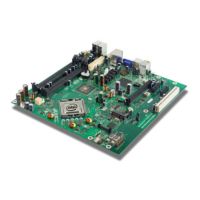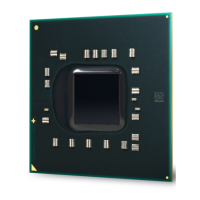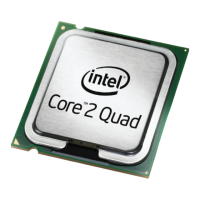Errata
62 Intel
®
Core™2 Extreme Processor X6800 and
Intel
®
Core™2 Duo Desktop Processor E6000 and E4000 Sequence
Specification Update
Status: For the steppings affected, see the Summary Tables of Changes.
AI113. When One Core Executes SEXIT the Other Core's Last Branch
Recording May be Incorrect
Problem: In processors supporting Intel
®
Trusted Execution Technology when one core
is executing SEXIT and the other core is executing a control-transfer
instruction, the FROM_IP field contained in the last branch information may
be incorrect for the following:
• LBR (Last Branch Record) MSRs
• BTM (Branch Traces Messages) on the bus
• BTS (Branch Trace Store) records written by the debug store mechanism
Implication: Due to this erratum, last branch information may be incorrect after one core
executes SEXIT. Intel has not observed this erratum with any commercially
available software.
Workaround: None identified.
Status: For the steppings affected, see the Summary Tables of Changes.
AI114. A GETSEC[ENTERACCS] Instruction Executed Immediately after
GETSEC[WAKEUP] Instruction May Result in a Processor Hang
Problem: In dual core processor systems supporting Intel
®
Trusted Execution
Technology, a processor hang or unpredictable system behavior may occur if
the ILP (Initiating Logical Processor) executes GETSEC[WAKEUP] and then
executes GETSEC[ENTERACCS] without making sure that the RLP
(Responding Logical Processor) has woken up in between these two
instructions.
Implication: This may cause the processor to hang or execute code down an unintended
path.
Workaround: Software must be written to ensure that the RLP has woken-up in response to
GETSEC[WAKEUP] instruction and then execute GETSEC[ENTERACCS]
instruction.
Status: For the steppings affected, see the Summary Tables of Changes.
AI115. Instruction Fetch May Cause a Livelock During Snoops of the L1 Data
Cache
Problem: A livelock may be observed in rare conditions when instruction fetch causes
multiple level one data cache snoops.
Implication: Due to this erratum, a livelock may occur. Intel has not observed this
erratum with any commercially available software.
Workaround: It is possible for BIOS to contain a workaround for this erratum.
